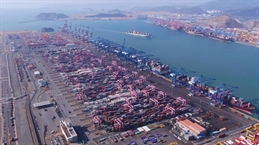
South Korea has announced plans to invest 14 trillion won (US$10 billion) to develop Jinhae New Port, the second major port in Busan. The initiative aims to double the southern port city's current container capacity by 2045.
The Korean government said the move is in line with the "changes in the shipping industry." It noted, for example, that other major ports worldwide, such as China and Singapore, are trying to attract global shipping companies by enlarging terminals, building smart ports, and making ports eco-friendly.
"As changes in the supply chain are expected to accelerate due to the strengthening of protectionism in major countries, it is necessary to reinforce competitiveness proactively to continue to attract global shipping companies to Busan Port amidst the changing logistics environment," the Ministry of Ocean and Fisheries (MOF) said in a statement.
By developing the Jinhae New Port, the government aims to increase Busan's container capacity from 21.2 million twenty-foot equivalent units (TEUs) in 2023 to 39.66 million TEUs by 2045.
Busan Port handles 76.8% of domestic container traffic, particularly over 97% of transhipment traffic. MOF noted that it had maintained its position as the world's second-largest transhipment port since 2015, attracting many shipping lines and providing a stable supply chain for the Korean economy.
The new development plan will build 66 berths in Busan Port, the same number as Singapore's TUAS Port, which is currently under construction and ranks first globally in transhipment.
The constructed facility will stably dock 30,000 TEU-class vessels—surpassing the world's largest vessels, which are 24,000 TEU—and create a container storage space 1.5 times larger than the existing dock.
"First, in line with the expansion of the fleet, MOF will invest KRW 14 trillion by 2045 to construct Jinhae New Port and secure Busan Port as the world's largest port facility," the announcement said.
As part of the South Korean government's "Global Hub Port Construction Strategy," a single operator will also be selected for all nine berths in Phase 1 of Jinhae New Port to establish the country's largest-scale operational system.
The announcement noted that having a single operator handle the entire alliance's cargo volume enables efficient berth management and minimizes transhipment to other berths.
To strengthen the connectivity between Busan Port as a hub port and overseas supply chain bases, overseas logistics centres in promising bases for supply chain reorganization, such as the Eastern United States, Southeast Asia, and Europe, will be expanded.
MOF said the current 5 logistics centres overseas will also be increased to 8 centres by 2027 and to 16 centres by 2032 to provide Korean SMEs with services such as priority usage rights and logistics consulting.
The Busan Port is also seeking to supply a port hinterland complex the size of 500 soccer fields (3.62 million m2) near the port to attract global logistics companies. Moreover, MOF will link with Gadeokdo New Airport to be positioned nearby to grow Busan Port into a land-sea-air logistics hub.
"There is a need to transform Busan Port into a mega port and improve its operational structure to respond to the enlargement of ships and strengthen shipping alliances," MOF said. "Accordingly, the government has prepared this plan to solidify the status of Busan Port as a global hub port and raise its competitiveness to the world's top 3 level."
Lastly, MOF said it will make ports eco-friendly by increasing the proportion of renewable energy generation within ports to 25% by 2032 and 100% by 2050.
"The restructuring of supply chains due to the rise of protectionism, regional conflicts, and changes in shipping alliances is both a crisis and an opportunity for our ports. Based on the Global Hub Port Development Strategy we have established, we will grow Busan Port into one of the global top 3 ports and transform it into a global logistics centre that firmly supports South Korea's dynamic economy," Minister Kang Do-hyung said.



